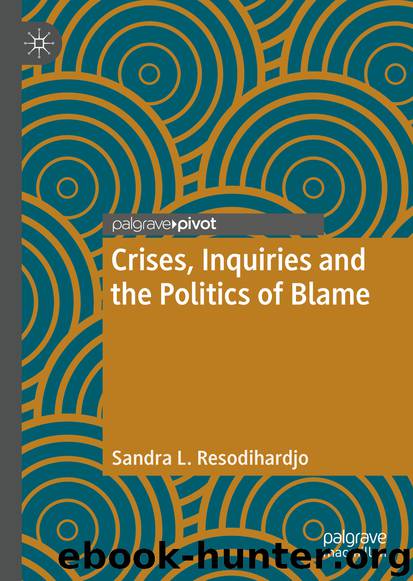Crises, Inquiries and the Politics of Blame by Sandra L. Resodihardjo

Author:Sandra L. Resodihardjo
Language: eng
Format: epub
ISBN: 9783030175313
Publisher: Springer International Publishing
4.2.2 The Blame Game
On 25 July, the director of Lopavent (Schaller) announced that the festival would no longer be organized.83 On that same day, the mayor held a press conference. The mayor made it clear that “the question why this happened can only be answered by those organizations [investigating the disaster]. (…) premature blaming would neither help the families nor the victims.”84 On the evening of the festival, the mayor had defended the safety plan. One of the mayor’s statements, however, resulted in upheaval because he said that people had tried to escape from the tunnel, but some of them had fallen down into the crowd. Consequently, panic had broken out. This statement was perceived as an implicit blaming of the festivalgoers—something which resulted in indignation, particularly on the internet.85
While there was public outrage about what had happened, the Public Prosecutor’s Office started an investigation in order to determine what had happened and who was responsible. Cologne’s police force conducted the investigation because Duisburg’s police force might have been affected by the events and/or might not be able to objectively conduct the investigation.86
Meanwhile, questions were raised in the media about the choices made prior to the festival as safety concerns had been brushed off.87 Actors involved in the organization and management of the festival were also criticized for not wanting to be held accountable. From the start, actors shifted blame away and were hesitant to answer the media’s questions since the Public Prosecution’s Office was still conducting its investigation.88
The public’s outrage was focused on mayor Sauerland (CDU). They wanted him to take responsibility and resign—a call which was supported by various actors, including the police union, someone from the mayor’s own political party, and representatives of other parties.89 The citizens of Duisburg were so angry with their mayor that he needed to hire protection for himself and move his family away from Duisburg.90
The mayor made it clear that he was sorry for what had happened, but that he was not going to resign.91 He stated that he had not been involved in organizing the Love Parade; that he had merely executed the unanimous decision by the municipal council to hold the festival in Duisburg; and that he would help in any way he could with the investigation.92 Besides, he could not resign because that would negatively affect his pension.93 The municipal council could dismiss him though, but that would require a two-thirds majority.94
The mayor was not the only one who was blamed for what had happened. The municipality,95 Lopavent and its owner Schaller, and the police were also blamed. Their blame responses included blaming each other.96 The municipality faced fierce criticism because it had known about the safety problems.97 Questions were raised about the permit procedure and who had forced whom to agree to the festival.98 According to Dressler99 (Planungsdezernent), it looked as if the disaster had been the result of “a communication breakdown between the police and the organizer.”100 Moreover, his department had only approved the plans for the festival area and not the access roads.
Download
This site does not store any files on its server. We only index and link to content provided by other sites. Please contact the content providers to delete copyright contents if any and email us, we'll remove relevant links or contents immediately.
Machine Learning at Scale with H2O by Gregory Keys | David Whiting(4282)
Killers of the Flower Moon by David Grann(4024)
Oathbringer (The Stormlight Archive, Book 3) by Brandon Sanderson(3109)
Will by Will Smith(2891)
Once Upon a Broken Heart by Stephanie Garber(2820)
Guns, Germs and Steel by Diamond Jared(2350)
It Starts With Us (It Ends with Us #2) by Colleen Hoover(2318)
Borders by unknow(2297)
Friends, Lovers, and the Big Terrible Thing by Matthew Perry(2208)
The Room Where It Happened by John Bolton;(2140)
The Color of Law by Richard Rothstein(1913)
The Strength In Our Scars by Bianca Sparacino(1832)
HBR's 10 Must Reads 2022 by Harvard Business Review(1828)
A Short History of War by Jeremy Black(1827)
A Game of Thrones (The Illustrated Edition) by George R. R. Martin(1693)
Water Rights and the Environment in the United States by John Burch(1670)
515945210 by Unknown(1654)
Examples & Explanations: Administrative Law by William F. Funk & Richard H. Seamon(1628)
That Every Man Be Armed by Stephen P. Halbrook(1574)
